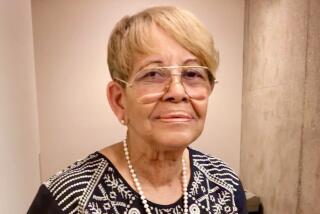From the Hood to Harvard : Although role models were in short supply as he was growing up in South-Central, Tim Anderson has not strayed from his goal of getting a higher education. : TIM ANDERSON
- Share via
In July, I spoke to students at UCLA and mentioned that I was interested in becoming President of the United States. That was the first time they had heard somebody say they wanted to be President--especially somebody with my background.
I think the country will be ready for a black President in the next 20 to 25 years. My goal is to run for senator, governor and then President, because I believe I can have a tremendous impact on people.
Life was tough growing up in South-Central. There weren’t many opportunities. Most of the older guys I grew up with were involved in gangs, and some were in and out of jail. But they sat me down and said, “We don’t want you to turn out to be like us. We’d like to see you get an education, do something with your life.” I respected them because they were nice people; they treated my family nice. They were people I could talk to about anything. They were my neighbors and close friends.
There were times that I wanted mentors around, people who had been politicians or who are doctors, lawyers, entrepreneurs living in the area--but there weren’t any. There wasn’t anybody I could talk to about a career or about education.
My mother is Hispanic. She grew up in Jordan Downs and raised three children. She had a huge impact on me deciding to do something with my life. She sat me down and said: “You could get into a lot of trouble, go to jail, make a lot of mistakes. I’ll still love you because you’re my son, but I’d like you to do something with your life. Get an education, become somebody--like Dr. Martin Luther King Jr. The decision is yours; you can’t come back to me and blame me for anything.” I was around 13.
Friends of mine were getting killed by the time they were 16. Some were involved in things they shouldn’t have been involved with, some were just in the wrong place at the wrong time; I didn’t want to live that life.
My daughter was born nine days after my 16th birthday. It made me realize I had a big responsibility. There was pressure on me from my family to make sure that I did the right thing and be a father to her, plus I felt deep inside this was a child that I was going to love and do my best for her because I grew up without a father. When I went to UCLA, I took her to school with me a few times so she could see what it was like. When I got accepted to Harvard, she was the first person I called. She was proud, she started clapping--now she wants to go to Harvard.
I was always the type of person that if somebody told me I couldn’t do something--that I couldn’t get a job or wouldn’t be able to go somewhere because I couldn’t afford it--I’d say, “Look, there’s a way to do it.” I would focus on doing something, take care of business and get the job done.
I treated people the way I wanted to be treated--with respect. A lot of the older guys would look out for me because I listened to them. I would fight if I had to, because I didn’t want to be pressured to do things.
When I graduated from UCLA, everybody in the neighborhood was proud. I may not be able to help them out immediately, but eventually I’ll be able to help their children in terms of providing them with the tools and resources to be prepared for college and a career.
After I graduate from Harvard, I plan to start some businesses in either media, manufacturing or education. I feel it’s my responsibility to go back and help people, because if other people are in a position where they can do a lot for themselves--they can get a job, get a good education, they can buy their own house and feel secure--then they can help somebody else. They can set an example for somebody else, like the people who set an example for me--my mother and Linda Oubre, an audiotext program manager.
One person can make a difference. As a kid I used to think, if I had grown up in the ‘60s, would I have become a person like Dr. Martin Luther King Jr. or any one of the civil rights leaders? I kept coming to the same conclusion: Yes. I couldn’t see myself sitting back and not doing anything.
More to Read
Sign up for Essential California
The most important California stories and recommendations in your inbox every morning.
You may occasionally receive promotional content from the Los Angeles Times.













